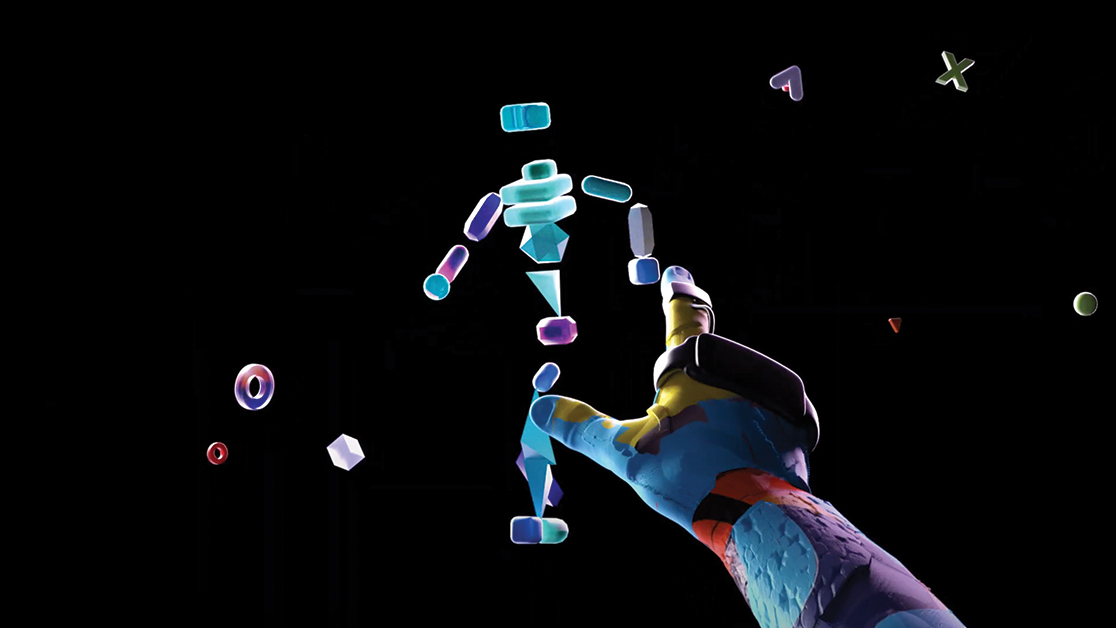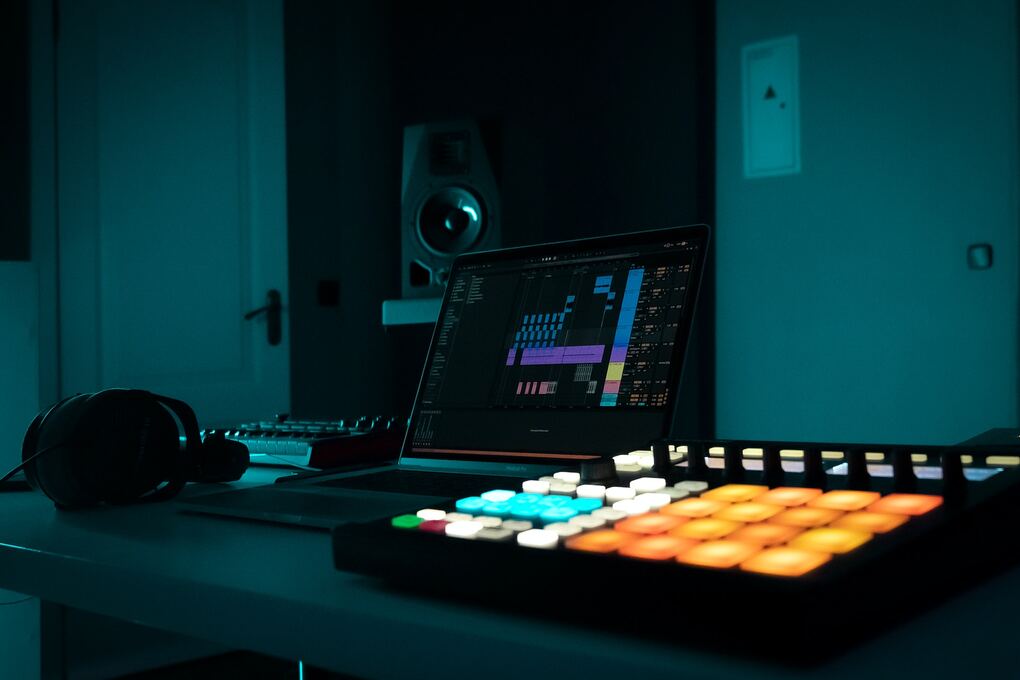The music world has entered a new era of music production where artificial intelligence (AI) is revolutionising the industry. Our Audio Production course aims to respond to these latest music tech innovations and help our students get to grips with them to further their careers. Contact us to learn more about the degree and check out our blog on how AI can shape the future of music below…
The impact of AI in music production has become a big topic of debate, sparking heated discussions on whether it be will used to enhance today’s music or go as far as replacing musicians and songwriters.
Antonio de Robertis, Audio and Music Business Programme Coordinator, said: “It’s important for students to explore AI, to see how human beings can work together with technology to refine a product. It’s still in its infancy in music production, mixing and mastering – and a lot of students focus on it as a part of their final project.”
Let’s find out more about the role of AI in audio production and its potential to transform the music world…
The Role of AI in Audio Production: A Double-Edged Sword?
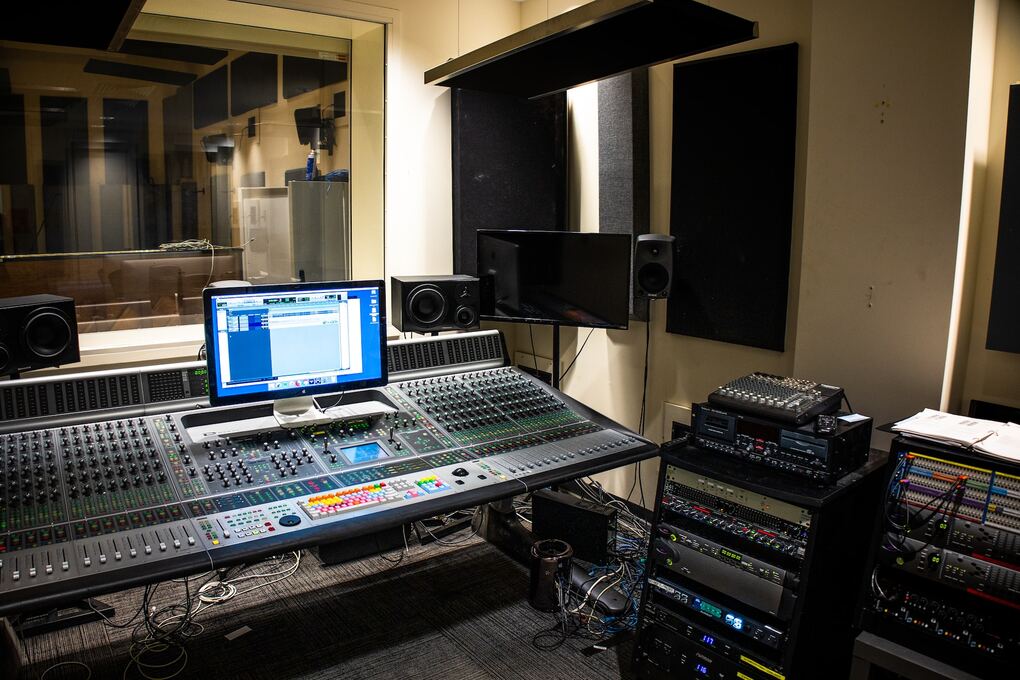
The possibilities of AI in music production are huge.
Entirely new listening experiences can be created by technology analysing vast amounts of data and generating unprecedented sounds. It shows how the influence of AI is changing the dynamics of how we create, produce, and appreciate music, indicating a revolution in the music industry.
However, as with any great power, it comes with great responsibility. The possibility of AI taking over human tasks like mixing and mastering brings about concerns of job loss and a lack human input in future music production.
Despite these worries, AI should not be seen as a threat but an incredibly powerful tool. AI can enhance human creativity, offering a plethora of possibilities although there are challenges that need to be addressed to ensure a harmonious future.
Enhancing Human Creativity
With AI as a creative collaborator, a large amount of possibilities can be unlocked.
Create unique sounds, tunes, and harmonies
AI has to the potential to enable musicians to discover new possibilities and an effective source of musical inspiration. These include:
- Providing inspiring suggestions
- Generating fresh sounds
- Aid in composing
The AI revolution invigorates human creativity in music production.
Maintaining a balance is necessary as AI can enhance creativity, but relying on it too much can hold it back. For an optimal use, it’s important that musicians and producers leverage its capabilities while preserving their innate creativity and human touch. Otherwise, the music could be in danger of losing any sense of character or personality.
Potential Replacement of Human Tasks
The potential of AI to handle tasks like mixing and mastering is undeniable.
However, ethical and legal concerns, such as ownership and copyright issues, must also be addressed by the wider sector to ensure a fair and sustainable future for AI-generated music.
One must remember, AI’s purpose is not to replace human artists, but to amplify talent. By striking the right balance, the music industry can embrace the exciting possibilities AI brings while preserving the unique charm and emotional depth that only human creatives, audio producers and artists can offer.
AI-Driven Music Production Tools
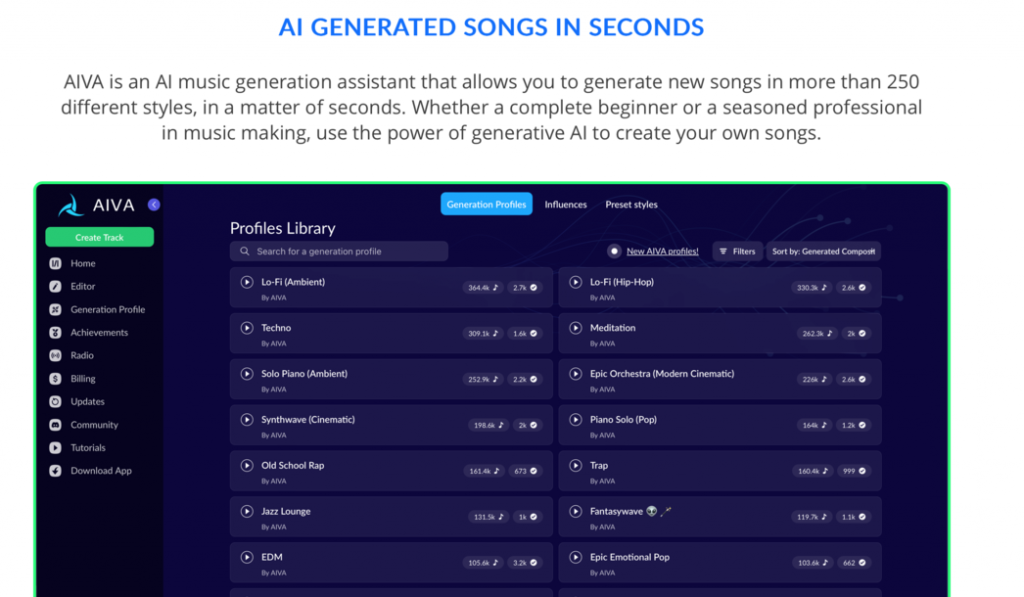
Music production tools powered by AI are making waves in the industry, providing remarkable applications for composition, mixing, and mastering.
These tools are pushing the boundaries of music creation, opening up amazing new possibilities for music producers.
From AI composition tools that analyse patterns and emotions to generate new sounds and genres, to AI mixing and mastering tools that handle tasks like balancing levels and improving sound quality, the future of music production could be shaped by AI.
AI Composition Tools
AI composition tools can perform a variety of different tasks including analysing patterns and emotions to generate new sounds and genres. Using machine learning algorithms, these tools learn from large amounts of musical data and identify patterns such as chords, tracks, and other musical elements to create new and unique compositions.
Some exciting examples of AI composition tools used in the music industry include:
AI Mixing and Mastering Tools
AI tools for mixing and mastering, like iZotope’s Neutron and Ozone, are transforming music production methods too.
These tools can handle tasks like balancing levels and improving sound quality, but they struggle to replicate human artistic decisions and musical intuition.
Despite some drawbacks, AI tools for mixing and mastering hold immense potential in improving music production processes and raising the bar for sound quality.
The Emotional Dimension: Can AI Truly Replace Human Expression?
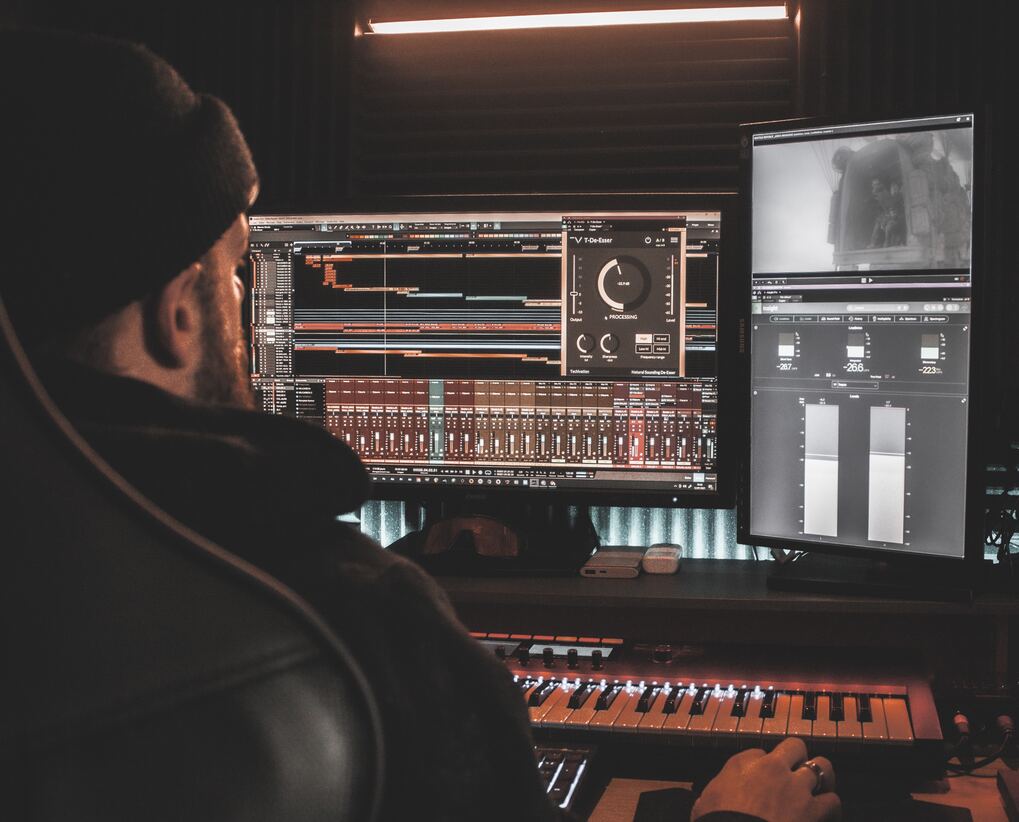
As music generated by AI becomes increasingly common, doubts emerge about its ability to truly match the emotional depth and of human expression. While AI can generate music, it often lacks the authenticity that comes from human creations.
Our connection with artists goes beyond just the music itself too. We familiarise ourselves with their stories and song lyrics to become fans of both their music and them as people. We gain a deep appreciation for the artists through these processes, something which AI-generated music can’t yet achieve.
The Future of Collaboration Between AI and Human Musicians
The future of music production hinges on the partnership between AI and human musicians, with new forms of collaboration emerging alongside new ethical and legal concerns.
Some key aspects of this include:
- AI and human musicians working together to push the boundaries of new sounds and genres.
- Producers potentially shifting their roles toward curation and refining AI-generated content.
- The need for ongoing discussions and regulations to address ethical and legal concerns surrounding AI-generated music.
This collaboration has the potential to revolutionise the industry and create exciting new possibilities.
However, for the successful integration of AI into music production, ethical and legal issues, like ownership rights and transparency in algorithm-driven decisions, need to be addressed.
New Forms of Collaboration
AI and human musicians can work together to create a musical landscape that pushes the boundaries of new sounds and genres. By collaborating directly with artists to generate art that combines human and machine creativity, AI-driven tools can assist music labels and empower artists in unprecedented ways.
The role of producers may shift towards curating and refining AI-generated content, with a focus on maintaining the balance between AI-generated music and human creativity. As these new forms of collaboration emerge, the music industry will continue to evolve and grow.
Addressing Ethical and Legal Concerns
For successful integration of AI into music production, it’s important to deal with issues, like ownership rights and transparency in algorithm-driven decisions. The current laws regarding AI-generated music and ownership rights are still evolving, with licensing and contract agreements likely playing a role in regulating ownership and ongoing use of AI-generated music.
To ensure a fair and sustainable future for AI-generated music, it is essential to address these concerns.
Embracing AI in the Music Industry: Challenges and Opportunities
Adopting AI in the music industry brings with it exciting challenges and opportunities, like dealing with resistance to change and promoting diversity and inclusion. These challenges can be addressed through education, collaboration, and designing AI tools to enhance creativity.
By promoting understanding and trust in AI-generated music, and addressing concerns about creative control, the music industry can look to a positive future with this innovation.
Overcoming Resistance to Change
For a successful integration of AI into music production, overcoming resistance to change is vital, as it offers numerous benefits and opportunities for growth and innovation. The challenges in overcoming resistance to the adoption of AI in music production include:
- Fear of job displacement
- Lack of understanding and trust
- Concerns about creative control
- Cultural and artistic preservation
- Technical challenges
Strategies for overcoming resistance to technological change in the music industry include:
- Communicating the benefits
- Comprehensive training and support
- Dynamic collaboration and involvement
- Smooth gradual implementation
- Illustrating success stories
Fostering Diversity and Inclusion
Promoting diversity and inclusion in the music industry can help reduce algorithmic bias, create a representative ecosystem, and make AI-driven music production tools available to a larger audience.
By diversifying the training data used to develop AI music production systems and ensuring that it includes a wide range of musical styles, cultures, and voices, the industry can reduce algorithmic bias and promote a more equitable and representative music ecosystem.
Open-source projects and affordable pricing models are key tools in making AI-driven music production accessible to people from all walks of life. Such initiatives can have a profound impact, broadening the horizons of many aspiring musicians.
Summary
In conclusion, the exciting potential of AI in music production is undeniable. AI can enhance human creativity, revolutionize the way we create and enjoy music, and transform the industry as we know it. However, it is essential to strike a balance between AI-generated content and human creativity. This is the way we can embrace the benefits of this technology in a way which will be positive for all stakeholders in the creative process.
Frequently Asked Questions
What is the future of AI in music production?
AI is ushering in a new era of music, allowing for the development of entirely new sounds and genres, as well as the promotion, polishing, and distribution of musical tracks. NSynth and other projects are demonstrating that AI can master audio processing operations to create unique sounds that can shape the future of music production.
Will music producers be replaced by AI?
AI won’t be able to completely replace music producers as it can’t replicate the creative process. However, it might change the ways musicians interact with the creative process and refactor their workflows.
Is AI in music production enhancing human creativity or replacing it?
AI in music production has the potential to augment our creativity, however there are valid concerns that it could supplant human creative expression. We must be mindful that AI-generated music lacks the soul and authenticity that come from humans.
What are some examples of AI-driven music production tools?
Exciting AI-driven music production tools like iZotope’s Neutron and Ozone for mixing and mastering, AIVA, Amadeus Code, and OpenAI’s Muse Net have revolutionised the industry.
What are the ethical and legal concerns surrounding AI-generated music?
AI-generated music raises important ethical and legal questions such as ownership and copyright, the impact on creative jobs, and how to find a balance between machine and human creativity.
Study Audio production at SAE
At SAE, our Audio Production Degree can help students learn the latest production skills and techniques to further their careers.
Although AI is in its infancy, our course encourages students to adopt a future-facing mindset where they are keen to understand more about how innovation and technology will shape the industry and their work.











